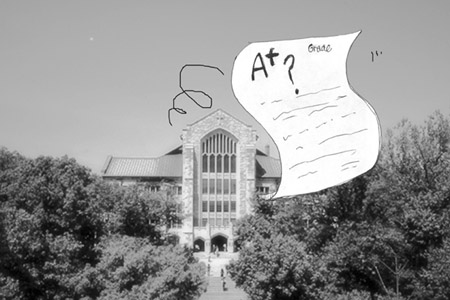
November was a month mingled with feelings of joy and sorrow for 500,000 gosams (high school third-year students) who took the college entrance exam on the 15th. Somewhere in that crowd of beginners searching for right university, there must be students planning to build bright future on the Ewha campus. For these beginners, what points would you recommend about Ewha?
The school’s 121 year history? The beautiful campus? Friendly seniors? Starting from next year, the answers are expected to also be in the form of pure numbers.
The Act on Disclosing Information of Educational Institutions (Educational Information Act), passed by the National Assembly on September 30 has stirred controversy among universities. The act stipulates that educational institutions, including universities, reveal information about operating expenses and educational conditions to the public. Punitive measures, including a cut in government support, will be applied to universities not abiding by this law.
As soon as the Act was passed, the Ministry of Education and Human Resources Development released 84 information items that need to be publicized. The items include information sensitive to universities such as the amount of donations the school receives, the total amount of scholarship and the employment rate of graduates. Up to now, most of those items have not been fully open to the public. Rather only some information that is useful in promoting the school was singled out to be used in advertisements. The Educational Information Act was passed to abolish such selective practices, improve students’ access to information, and intensify transparency in university management.
Amid mixed responses from universities, Ewha has shown support for the act. Woo So-jung, manager of the Office of University Planning and Coordination, said that Ewha plans to post the required information on its website. “It is a good opportunity to encourage competition among universities and raise the quality of their education. Ewha will try hard to keep good records in every area. We respect students’ rights as consumers of educational services, so they ought to know how the school operates,” said Woo.
Most of the high school students also welcome the change. Kim Ho-yoon (17), who recently got admitted to the Division of International Studies at Ewha, says that she did not have enough information when choosing a university. “Even though I decided which school to go to, this was not because I knew something about the school,” said Kim.
Ewha students also seem to be positive about the act. “I never had access to the financial reports of the school. If we get to know how our tuition fees are is being used, trust will be built between the school and the students,” says Kim Hye-seong (Liberal Arts, 1). Regarding possible areas of poor performances, Lee Ye-ram (Law, 1) says, “Not everything can be perfect. I believe if we know what our drawbacks are we will be able to focus on those parts and, thus, hope for better results next time.”
Despite the intention and purpose of the Educational Information Act, the consequences after the enforcement of the act are uncertain. In an open debate on the act held by the Korea Educational Development Institute on September 13th, officers from universities located in provinces outside of
Wu said, “Numerical indicators cannot assess many important values schools have, such as history and culture; therefore the results may not be the best data for students. Nevertheless, Ewha will still work hard to keep a good record on the government chart.”

